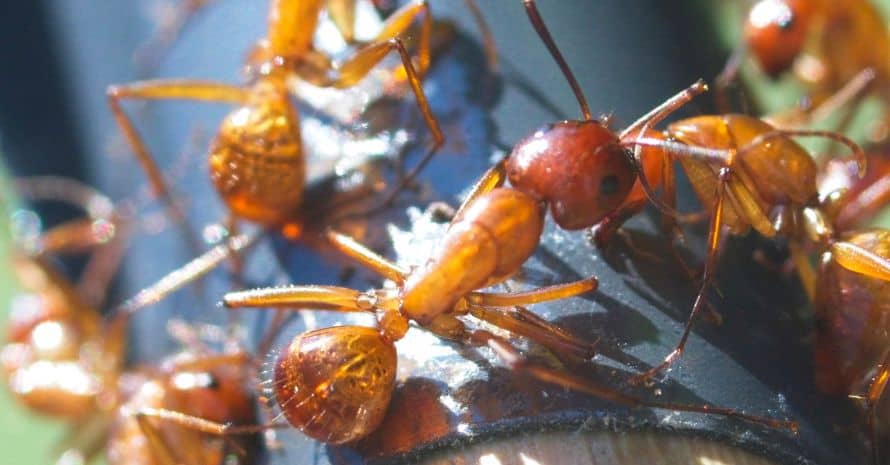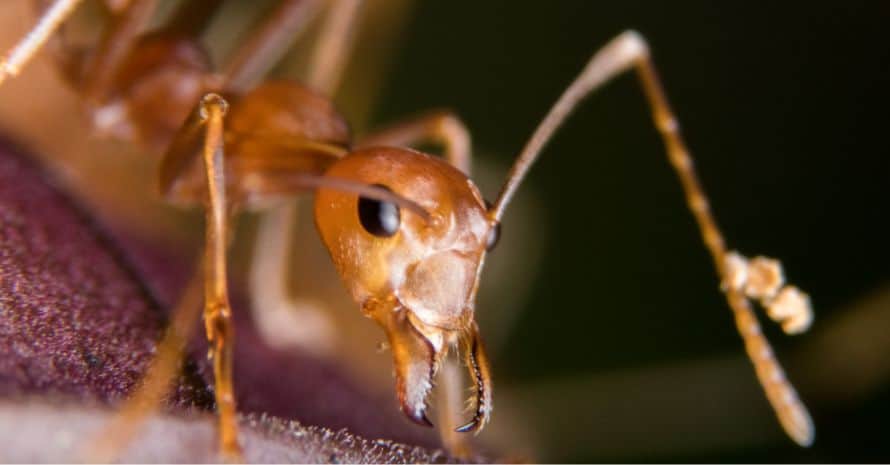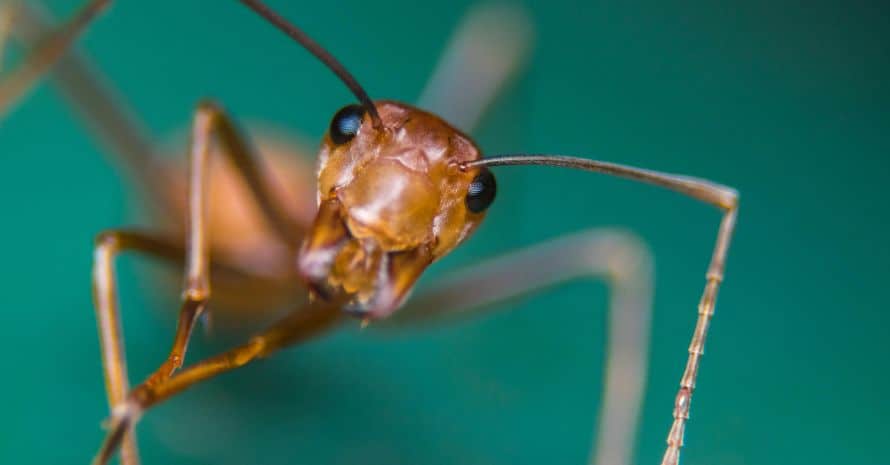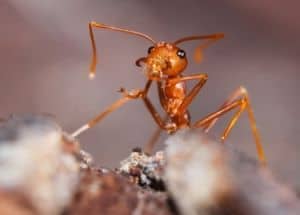Fire ant colonies are a big problem: these insects reproduce quickly, are omnivores, damage the ecosystem and farmlands, and are extremely aggressive. Colonies also have more than one queen, making getting rid of them very difficult. These pests can survive in the wild. However, their amazing adaptability does not prevent ants from settling near or under your house. The human dwelling always offers many sources of food, so you should know “What do fire ants eat?” to be ready for the infestation.
[wpsm_titlebox title=”What Do Red Ants Eat?” style=”main”]
- Insects (other species of ants, termites, earthworms, eggs and larvae of flies, fleas or cockroaches);
- Plants and oily seeds (including agricultural crops: corn, soybeans, potatoes);
- Invertebrates (scorpions, chiggers, and spiders);
- Vertebrates (reptiles, mammals, and birds);
- Sweets (honeydew, plant nectar, honey, peanut butter, molasses);
- Carrion.
[/wpsm_titlebox]
Food Preferences of Fire Ants
So what attracts fire ants? These pests eat almost everything: from plants to carrion. They need fats, proteins, and carbohydrates to survive. Insects do not disdain human food, so if you notice fire ant beds near your house, hide everything that can attract them. The beds (also called mounds or hills) are a sign of the presence of this ant species in the vicinity. These are mounds of soil up to 20 inches above the surface that worker ants threw out while constructing underground tunnels.

Plants
Like most ant species, red ants feed on plants. They are attracted to their sweet nectar. Also, these insects can destroy most of the crop. They damage different parts of plants: from roots to young stems. They eat germinating corn and soybean seeds, potato tubers, and ripening citrus fruits.
Invertebrates
Spiders and scorpions also eat red ants. Therefore, often small insects have to attack and kill these invertebrates with their poisonous sting. Thus, ants can be both preys and predators. Spider eggs are also an excellent food source for them. Female ticks, which are swollen with eggs and blood, and their newly hatched offspring are often targeted.
Vertebrates
As you know, aggressive and predatory species can kill prey hundreds of times their own size. Newly hatched individuals are in danger and can be eaten by fire ants. These include crocodiles, birds, turtles, snakes, and lizards.
Large mammals also suffer from these small pests. Humans are not on this list and suffer only from the stings or results of the fire ants infestation. Insects make their way to newborn fawns and injure their eyes with poisonous stingers when the mother is not around. In the same way, they can harm calves or rabbits.
All types of rodents are at risk if there is a fire ant pile nearby. Of course, killing pests, such as rats and mice, cannot be a nuisance for a human. The problem is that insects are not limited to hunting animals that are harmful to humans. Therefore, fire ants pest control is a must on farms where livestock or poultry are grown.

Insects
Red ants eat the larvae of other insects, such as flies, cockroaches, or fleas. Other species of ants also fall prey to their aggressive counterparts. To feed other individuals in the colony, pests may kill termites, butterflies, earthworms, or caterpillars. If a weakened colony of honey bees is encountered in the way of these omnivore insects, it will be eaten.
Sweets
Sweet foods are a rich carbohydrate source, essential for energy production. Fire ants find sweetness both in nature and in the human home. They feed on plant nectar and honeydew. This is the substance that aphids and mealybugs produce.
An incredible fact is that this type of ant creates entire farms where mealybugs or scale insects are protected. They produce a sweet secretion that the ants eat. In your home, fire ants will definitely like sugar, honey, peanut butter, molasses, syrup, and most products containing sugar.
Carrion
Dead animals that have begun to decay (carrion) are attractive to fire ants. It is one of the most common food sources for these small insects in the wild. The body of a dead animal is rich in protein, which is extremely significant for survival and makes up a fairly large part of the diet of omnivorous ants.

How Do Fire Ants Find Food?
The colony has ants that wander around in search of food sources. They are called worker ants. After finding food, they return to their nest and mark the ground with pheromones along the way. This trail helps other individuals return to food and carry the prey to their relatives.
Fire ants can kill a large animal. They repeatedly sting it and inject a toxic poison, resulting in the victim dying. However, worker ants can only eat tiny pieces of food or feed on liquid. Therefore, they use their strong jaws to disassemble the prey into many small pieces and take them to the colony. Some individuals are in the fourth stage of the red ant larvae development and can turn solid food into liquid. It is they who feed all the other ants.
What Are Fire Ants Attracted To?
In nature, they are usually predators or scavengers and eat plants, seeds, other insects, and animals. Living near a human home offers many options, among which sweet and fatty foods are the most attractive to pests. In addition to these products, red ants like cat and dog food.
[su_youtube url=”https://www.youtube.com/watch?v=l0c8mFSX0FY”]
FAQ on Fire Ants Eating Habits
Information about the feeding habits of these insects will be useful to those who have detected red ant hills near their home.
What is fire ant’s favorite food?
In the wild or near human habitation, all food sources high in fat, oil, and sugar will become the preferred food source for these omnivorous pests.
Do fire ants eat human food?
Yes, they will happily eat most of the foods people keep in the kitchen. Particularly attractive are products containing sugar, fat, and oil. Syrup, honey, or sweet soda spilled on the floor will surely attract several individuals.
What do fire ants drink?
Like any other living organism, the red ant needs pure water. The insect finds it in small puddles, in nature, or near people’s houses. The ant also receives enough moisture when drinking plant nectar or honeydew.
Tiny Size but Brutal Appetite
The combination of omnivorousness and aggressiveness makes red ants one of the most vicious pests. If there are cases of infestation in your area, study the feeding habits of these insects and hide all food in the house. Even a rubbish bin can attract a colony. It is easier to prevent infestation since getting rid of these pests is very difficult. If they have already attacked your house or farm, I recommend seeking help from a fire ant exterminator. Do you prefer to ask for professional help to get rid of pests or deal with them on your own?

